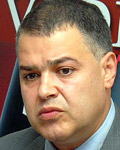– The Armenia co-rapporteur of the PACE John Prescott during the session taken place in Paris stated that the problem of the politicians persecuted for their political views is not solved in Armenia and that they thought that all of the political prisoners would be released as a result of amnesty. Has the PACE attitude become stricter?
– I wouldn’t say so. Principally they have the same approaches are expressed in the resolutions. The speech was pretty harsh in another aspect. They have greater expectations from our country and Prescott was referring to the matters that need to be most taken care of during his upcoming visits. I cannot give more details on what has been said during the session in Paris because these sessions are confidential. Moreover, during the last session we have noticed that there was some outflow of information from the Georgian side. I don’t want to appear in the same situation.
– Are the expectations also connected with the release of political prisoners?
– They are connected with all the matters that have been included in the previous resolutions.
– At any rate, you, as the head of the Armenian delegation, who at any rate tries to respond regarding the process of the fulfillment of the PACE resolutions on part of Armenia, do you think the Armenian government has depleted its chances of keeping the political prisoners in jail?
– From the first sight, if we review the issue in the legal aspect. The main versions are the full execution of the punishment, conditional release, amnesty and forgiving. As of amnesty the President of the country has already expressed his standpoint by saying that if there are other amnesty requests we will be willing to discuss those as well. The amnesty is the function of the president and I cannot say anything about that matter. And I also think that amnesties are not repeated very frequently. Conditional release is more possible, where other bodies are included as well – courts, penitentiary based on the President’s decree.
– You have mentioned these three versions long ago. But there is an opinion that the political prisoners may be released due to the moderation of their punishments and that the government is working on such a bill. Such an opinion was also expressed by MP Rafik Petrosyan.
– I suppose that Petrosyan meant another bill, which I cannot say to what extent is connected with the release of political prisoners. I am not sure to what extent this bill can be connected with the March 1 events. This is more like a bylaw matter.
– You have recently mentioned that the government hasn’t given its response to certain matters and bills. What bills do you mean?
– They mostly relate to the social sector. There are objects connected with the minimum consumption basket, regarding to which the government hasn’t yet given its opinion despite the termination of deadlines. We have also raised a number of other issues. Specifically we are requesting the government to express its opinion regarding certain annexes of laws and we have those attached. The government has given answers to not all the questions and the monitoring is still continuing. So we will continue the fulfillment of recommendations.
– In your conclusions you have mostly adverted to the law-enforcement sector. But the most part of the recommendations of the committee on examining the March 1-2 events mostly related to social and economic sectors. Why do you have little information to these sectors?
– The conclusion of the ad hoc may be divided into several parts. The first part includes those actions, which are very concrete and measurable. And it evidently demonstrates the steps, which the government should undertake to improve the situation. Of course they were demanding certain details, which we did provide. We have exposed the internal contradictions and have submitted our clear demands to the government. But many of the questions of the ad hoc do not have clearly measurable results. It is more evaluating. For example, one of those evaluations is to undertake steps to establish social solidarity. Frankly said, I don’t know what the society expects in this regard and what the MPs expect. So these discussions will reveal their understanding around this matter. We think that this matter is so broad and inclusive that there can be no direct response or reaction on part of our ad hoc. This is the matter when the NA should personally conduct its analysis through laws and regulations.
– But there were more concrete questions in the conclusion – for example the reduction of the black market.
– This is also a quite common question. The legislative reforms of the tax code and some others are meant to reduce the shady economy. The majority of the budgetary packages are directed at improving the tax administration and cutting the black market. This cannot be a separate subject of committee evaluation. Our ad hoc can be more active regarding the matters, which require more concrete steps.
– There was an opinion that your ad hoc couldn’t advert to the activity of the committee headed by Samvel Nikoyan. There was an opinion that there besides the legal matters there were also social-economic questions and in order to monitor all that it would be necessary to establish another committee, where besides lawyers there would be experts of economics and social matters. At the beginning you were against that but now you are saying that the whole NA must be involved in this process.
– I don’t think the question is the ad hoc or the whole NA. Indeed, the part of the work that relates to measurable issues is connected with the State and Legal Issue committee and the committee of Internal Affairs. And I think that in this regard the correct decision was made.

